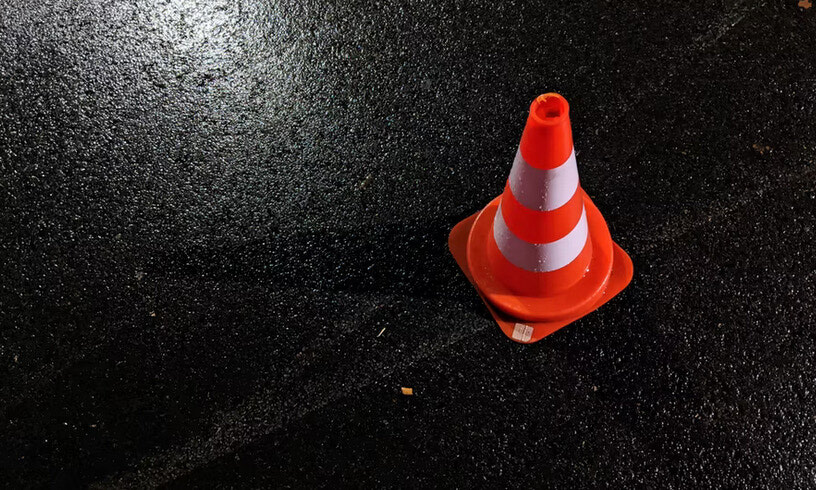And now, the Traffic Report
Many of us see traffic reports being done on television as we get ready for work, or listen to them on the radio while we're driving.
The answer may surprise you.
Going Old School
There were a couple of cute bits on the Global Edmonton Morning News program last week after the City of Edmonton's traffic cameras stopped working. Live shots from the traffic cams are normally used by traffic reporter Daintre Christensen, as she updates the audience on problems in traffic across Edmonton.
That left her needing to improvise and I loved her creativity.
Stealing Traffic
Seeing Daintre being forced to go “old school” with her traffic reports made me think of the days I used to be in radio and watched traffic reports being prepared in our newsroom.
I never did traffic and part of the reason is that I wanted no part of it. None.
Unlike news and sports, there was no news service feeding you stories. The poor traffic reporter had to show up for work in the morning and pray there was something good to put on the air. Whether it was bad roads, construction, or a major road closure, the life of a traffic reporter was shaped by what was happening on the roads.
A quiet morning meant a sombre traffic reporter. They love mayhem on the streets.
The other problem was finding out about accidents. Unless you worked for a station that had a helicopter or plane in the air, you had to make it up. Quite often, people doing traffic reports for radio stations without a chopper or plane stole information from those that did have somebody in the air. If they said there was an accident at a certain location, it magically appeared on the next reports of most of its radio competitors.
It wasn’t exactly great journalism, but you had to do what you had to do to put a traffic report together. Traffic reports came on at roughly the same time, so traffic reporters would listen to each other and steal the latest info for their report. If one reporter got it wrong, so did one or two others.
I remember one at least one occasion when our traffic reporter got an accident location wrong. It was kind of humorous listening to others who “somehow” made the same mistake.
From time to time, we would also get calls from motorists to let us know about accidents. That was always appreciated, but there were two problems. You had to hope when they gave you an accident location that it was correct. More often than you would suspect, the street or avenue we were given for an accident location wasn’t the right one.
The other problem was that you never knew how long traffic would be affected by an accident. There was really no way of knowing, unless the accident was updated by a radio or TV station with somebody in the air. Traffic reporters had to take an educated guess if they should still be talking about an accident around 30 - 40 minutes later. Even today when I hear a radio traffic reporter say “Traffic might still be affected by an earlier accident” I smile and know that’s code for “We really have no damn idea if it’s still a problem.”
Follow the Money
None of this would be a problem if traffic reports weren’t sponsored. If you had solid information about an accident that had just occurred and traffic was a mess, putting it on the air is a good public service.
The problem is, radio and TV stations like to make money on traffic reports, so they get the reports sponsored by advertisers and they can charge more for traffic report ads than other commercials in the same time slot. That means traffic reports need to be scheduled at specific times, such as every 15 minutes and that means the scrambling traffic reporter has to come up with something good every 15 minutes.
In Edmonton, Global TV and its sister stations on the Corus radio network use the services of a company that provides traffic reports. Having a chopper in the air for morning and afternoon rush hours Monday to Friday makes sense, but Global TV also uses reports from the chopper on Saturday and Sunday mornings.
You’re probably wondering why. Why do we need traffic reports on Saturday and Sunday mornings? There’s no traffic.
Of course you’re right, but it’s all about money. If a buck can be made with sponsored traffic reports, then radio and TV stations will have to keep cranking out the reports.
I’m amused by some of these reports. On a Sunday morning, there’s no traffic for the chopper to report, but “Hey here’s a live look over Hawrelak Park where people are just beginning to gather for that big charity run in about six hours from now.
Just don’t ask what it has to do with traffic, because it doesn’t. On the other hand, any time these days that a media outlet spends money covering something local it's a good thing.
Have some sympathy for those traffic reporters, especially the ones who are doing it without somebody in the air. They have a tough job and need to be creative. They usually are.
Video Credit: Global Edmonton


Commentary